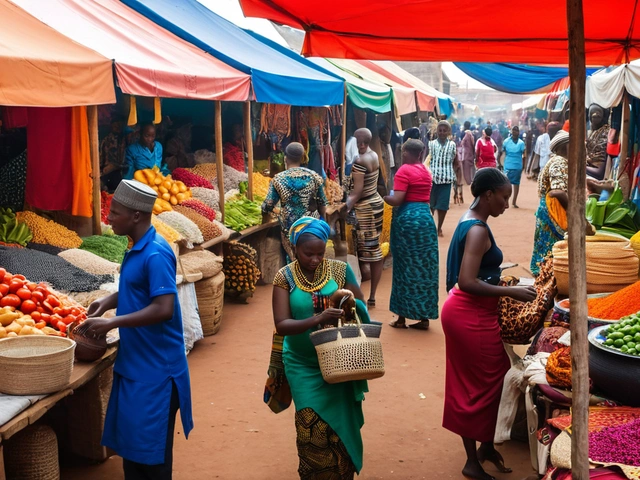Ethiopia is a country that often stirs thoughts of ancient history, vibrant culture, and resilient people. But how often do we associate it with immense wealth? The idea of Ethiopian billionaires may seem far-fetched to some, but it is crucial to delve deeper into the economic landscape to understand this dynamic.
The wealthiest individuals in Ethiopia have managed to amass significant fortunes, primarily through ventures in key industries. Who are these individuals, and what sectors drive their wealth? To grasp their journey, we need to explore the economic framework of the nation and identify the opportunities and hurdles they face.
In this narrative, we will meet some of the most affluent Ethiopians, examine the industries contributing to their wealth, and discuss the global recognition they have garnered. Let’s embark on this exploration and discover the financial titans that might be putting Ethiopia on the billionaire map.
- Ethiopia's Economic Landscape
- The Wealthiest Ethiopians
- Industries Driving Wealth
- Challenges to Wealth Accumulation
- Opportunities in Ethiopian Markets
- Global Recognition and Influence
Ethiopia's Economic Landscape
Ethiopia's economy is a fascinating blend of tradition and transformation. Nestled in the Horn of Africa, Ethiopia has one of the fastest-growing economies on the continent. For several years, the country enjoyed a growth rate exceeding 10% annually, driven by an array of sectors ranging from agriculture to services. However, this rapid growth presents a paradox as it coexists with widespread poverty and infrastructural challenges.
Agriculture remains a cornerstone of the economy, accounting for a significant share of the Gross Domestic Product (GDP) and employing a considerable portion of the workforce. Coffee stands out as the flagship product, earning Ethiopia the title of the birthplace of coffee. Teff, a staple grain, and flowers also play vital roles in export earnings. Yet, the agricultural sector faces hurdles related to outdated farming techniques and climate change, impacting productivity and sustainability.
In recent years, Ethiopia has made strides in diversifying its economic activities. The manufacturing and industrial sectors have seen substantial growth, buoyed by government policies aimed at fostering industrialization. The establishment of industrial parks, like the Hawassa Industrial Park, underscores the country’s ambition to become a manufacturing hub in Africa. These parks not only attract foreign investment but also aim to create job opportunities, thereby improving livelihoods.
The service sector, particularly in telecommunications and banking, is another area witnessing significant transformation. The liberalization of the telecom industry marked a watershed moment, with the entry of new operators promising to revolutionize connectivity across the country. The banking sector, although still in its nascent stages compared to global standards, shows potential as financial inclusion initiatives gain momentum.
However, the economic landscape is not without its challenges. Political instability and ethnic tensions have, at times, strained economic progress. Infrastructure, while improving, remains insufficient in rural areas, affecting logistics and access to markets. Additionally, regulatory hurdles and bureaucratic red tape can stifle entrepreneurial initiatives and foreign investments, making the business environment less competitive.
"Ethiopia's economic growth, while remarkable, stands as a complex narrative of strides taken against a backdrop of persistent challenges," states Abiy Ahmed, Ethiopia's Prime Minister.
Urbanization is another key factor shaping Ethiopia’s economic landscape. Cities like Addis Ababa are burgeoning with new buildings, roads, and commerce. This urban expansion creates a dichotomy, wherein urban centers flourish, but the rural regions lag significantly behind. Bridging this urban-rural divide remains a critical task for sustainable growth.
Investment in renewable energy projects, such as the Grand Ethiopian Renaissance Dam (GERD), also signals an ambitious vision for future development. Expected to be one of Africa's largest hydroelectric projects, the GERD represents not just an energy milestone but a symbol of self-reliance and resilience.
Foreign aid and remittances continue to play a supportive role in the economy. International organizations and diaspora communities contribute significantly, helping to alleviate some financial strains and investing in local businesses and infrastructure.
Understanding Ethiopia's economic landscape provides a backdrop to the question of whether Ethiopian billionaires exist. The country's rich resources, burgeoning sectors, and youthful population are fertile grounds for wealth creation. However, translating potential into tangible wealth requires navigating a complex array of socio-economic dynamics, policy directions, and global market trends.
The Wealthiest Ethiopians
The story of Ethiopia's richest individuals is both fascinating and inspiring. Some of the wealthiest Ethiopians have built their fortunes from the ground up, showcasing remarkable business acumen and resilience. Among these titans, names like Mohammed Al-Amoudi, Samuel Tafesse, and Abay Tsehaye resonate strongly.
Mohammed Al-Amoudi, often touted as one of the wealthiest Ethiopians, has his name etched on several prominent ventures. His portfolio includes oil and gas, agriculture, and construction, spreading across Saudi Arabia to Ethiopia. There's no surprise that his exceptional business journey made headlines internationally.
"Wealth isn't just about money; it's about having the freedom to achieve your goals and make an impact on the world," said Al-Amoudi in an interview with Forbes.
Another exemplar of Ethiopian wealth is Samuel Tafesse, the founder and CEO of Sunshine Investment Group. His company, which began as a small construction firm, has blossomed into a conglomerate with interests in real estate, hospitality, and education. Tafesse's rise in the business world highlights the importance of perseverance and innovation.
The late Abay Tsehaye also deserves mention. Known for his significant role in Ethiopian politics and his ventures in various sectors, Tsehaye's influence and wealth were considerable. His involvement in the Ethiopian Sugar Corporation stands as a testament to his business insight and economic contributions.
Ethiopia's entrepreneurs thrive in industries like construction, agriculture, and manufacturing. Their stories are testaments to their ingenuity and ability to overcome hurdles, not just locally but internationally. One might argue that their impact goes beyond financial success, reflecting the potential of Ethiopian markets in a global context.
While these individuals are some of the most notable names, many other wealthy Ethiopians contribute significantly to the country's economy. Their endeavors are a source of national pride, proving that Ethiopia is home to formidable business minds. Their successes inspire a generation of entrepreneurs who dream of having a similar impact on the nation.
In understanding the wealthiest Ethiopians, we see the broader picture of economic growth and potential within the country. Their stories serve as blueprints for achieving greatness within and beyond Ethiopia's borders, solidifying the nation's presence on the global economic stage.

Industries Driving Wealth
When it comes to the primary drivers of wealth in Ethiopia, several key industries stand out. These sectors have not only shaped the fortunes of the wealthiest Ethiopians but also play pivotal roles in the nation’s economy. Among these significant industries are agriculture, real estate, manufacturing, and the growing tech sector.
Agriculture remains the backbone of Ethiopia’s economy, employing around 85% of the population. The country’s fertile lands and favorable climate allow for the production of coffee, khat, maize, and other crops. Coffee, often referred to as “the black gold of Ethiopia,” is the country's top export. Private enterprises and individual farmers alike have seen immense profits from coffee production. Notable figures like Mohammed Al-Amoudi have invested heavily in this sector, driving substantial wealth accumulation.
Another flourishing sector is real estate. Urbanization is spreading rapidly in cities like Addis Ababa, where the demand for housing and commercial properties has skyrocketed. Local entrepreneurs and foreign investors are diving into real estate, developing residential buildings, shopping centers, and office complexes. This boom has propelled several individuals into the realm of significant wealth, as the value of real estate continues to appreciate.
Manufacturing also plays a critical role in wealth generation. This sector benefits from the government’s push to industrialize the economy and reduce dependence on agricultural exports. Textile, leather, and cement industries are some of the key manufacturing domains in Ethiopia. These industries don't just boost GDP but also create employment opportunities, thereby supporting economic growth. Investors and business moguls who tap into these opportunities often find themselves reaping significant rewards.
In recent years, the tech sector has emerged as a promising industry. With an increasing internet penetration rate and a youthful, tech-savvy population, startups in fintech, e-commerce, and tech services are gaining momentum. Initiatives like the Ethiopian space program highlight the government's commitment to technological advancement. Entrepreneurs who venture into this field often leverage the untapped potential of the market, leading to exponential growth.
Lastly, we can’t neglect the role of tourism in contributing to the country's wealth. Ethiopia’s historical sites, diverse landscapes, and rich cultural heritage attract millions of tourists. Investments in hotels, resorts, and travel agencies have allowed many to capitalize on this influx, contributing significantly to their fortunes. According to a study by the World Travel & Tourism Council, tourism contributed around 9.4% to Ethiopia’s GDP in 2019.
Overall, by recognizing the potential in these key industries and carefully navigating the associated challenges, individuals in Ethiopia can indeed achieve immense wealth. The drive and ingenuity of the people play a pivotal role in making these industries successful, painting a promising picture of the country's economic future.
Challenges to Wealth Accumulation
Amassing wealth in Ethiopia is not without its hurdles. For ambitious individuals looking to build their financial empires, there are several challenges to navigate. One of the primary issues is the country’s economic instability. Although Ethiopia has seen significant advancements, it is still susceptible to fluctuating market conditions and external economic pressures. Investors often have to be cautious and strategic, balancing risk with prospective rewards.
Another challenge is the regulatory environment. While there have been efforts to streamline business operations and regulations, bureaucracy and red tape persist. Often, entrepreneurs experience delays due to administrative procedures, which can stifle business growth and scare away potential investors. Many have voiced the need for more transparent and efficient business processes to boost the country's economic potential.
Access to capital is a significant barrier to wealth accumulation in Ethiopia. Financial systems are still developing, and obtaining large sums necessary for major business ventures can be difficult. Many rely on local banks, which may not offer the substantial loans needed for expansion. Although microfinance institutions are burgeoning, they primarily cater to small-scale enterprises.
Moreover, infrastructure woes cannot be overlooked. While there have been improvements in road networks, energy supply, and telecom services, they are still insufficient. Poor infrastructure can disrupt operations and increase costs, reducing the competitive edge of businesses operating within the country. The government is aware of these issues and is working tirelessly to address them, but progress takes time.
Political instability also plays a role. The country has faced periods of unrest and conflict, which deter investment. Political uncertainty can lead to abrupt policy changes, affecting business operations and long-term strategies. Stability is crucial for economic growth, and the government continues to strive for a steady and peaceful environment.
Education and skill development are other critical areas that need attention. The talent pool available for businesses may not always meet the specific needs of sophisticated industries. Educational institutions are working to bridge this gap, but current deficiencies can limit business progression. Training and development programs are essential to create a skilled workforce capable of driving growth in key sectors.
Lastly, there is the challenge of expanding into international markets. Geographical and logistical barriers can hinder the global outreach of Ethiopian businesses. Developing strong international relations and trade policies can aid in overcoming these obstacles, making it easier for businesses to thrive both locally and globally.
Despite these challenges, the determination and resilience of Ethiopia’s entrepreneurs are commendable. Many have achieved remarkable success, demonstrating that with perseverance and strategic planning, it is possible to overcome these barriers and pursue significant wealth accumulation in Ethiopia.

Opportunities in Ethiopian Markets
As Ethiopia stands on the threshold of economic transformation, a variety of opportunities present themselves in several sectors. The nation's rapid growth, young population, and untapped resources create a fertile ground for investors and entrepreneurs. One of the most promising sectors is agriculture. Ethiopia's vast arable land, suitable climate, and significant labor pool make it an ideal location for agricultural enterprises. Recent investments in modern farming techniques and technology have begun to increase productivity and efficiency, providing a strong foundation for future growth.
The manufacturing industry is another area ripe with potential. As labor costs rise in traditional manufacturing hubs like China, companies are looking to Africa, particularly Ethiopia, for cost-effective alternatives. The government has established Industrial Parks that offer attractive incentives to manufacturing firms. These parks have already attracted significant foreign direct investment (FDI) and have started to produce and export a range of goods, from textiles to electronics.
The energy sector also offers immense opportunities. Ethiopia has significant renewable energy resources, including hydro, wind, and solar power. Projects like the Grand Ethiopian Renaissance Dam (GERD) are set to place Ethiopia as a major energy exporter in the region. The government's commitment to green energy ensures a sustainable growth trajectory, attracting eco-conscious investors and reducing dependence on fossil fuels.
Infrastructure development is crucial for economic expansion, and Ethiopia is investing heavily in this area. From roads and railways to airports and telecommunications, the country is modernizing its infrastructure to support growth. Such improvements facilitate trade, enhance connectivity, and attract international business. One standout project is the Addis Ababa–Djibouti Railway, which has significantly reduced transportation costs and delivery times for goods.
Telecommunications offer another window of opportunity. With an increasing demand for mobile and internet services, Ethiopia's telecom sector is expanding rapidly. The government's decision to liberalize the market and invite private sector participation will likely lead to enhanced services and innovation. This sector's growth will have a ripple effect, boosting e-commerce, digital banking, and other tech-driven industries.
Tourism also holds tremendous potential. Ethiopia's rich history, diverse culture, and natural beauty make it an attractive destination for tourists. Efforts to improve infrastructure and promote the country globally are starting to pay off. Add to this, the government's visa-on-arrival policy for all African Union member states and several other countries, and you have a welcoming environment for tourists, both regional and international.
Given these prospects, it's no surprise that savvy investors are taking notice. Ethiopia's embarkment on these multi-faceted economic opportunities presents a chance for both local and international players to tap into a burgeoning market. As Prime Minister Abiy Ahmed once said,
"Ethiopia is open for business. The opportunities here are as vast as the land itself."Whether you are looking at agriculture, manufacturing, energy, infrastructure, telecommunications, or tourism, Ethiopia's market offers promising avenues for growth and investment.

 Top Countries Offering the Highest Salaries for Pharmacists in the World
Top Countries Offering the Highest Salaries for Pharmacists in the World
 Top Selling Products in Africa: What’s Hot in the Market?
Top Selling Products in Africa: What’s Hot in the Market?
 Is Ethiopia a Low Income Country? An In-Depth Look at Ethiopia's Economy
Is Ethiopia a Low Income Country? An In-Depth Look at Ethiopia's Economy
 Top Trending Careers in Ethiopia: A 2024 Insight
Top Trending Careers in Ethiopia: A 2024 Insight
 Can US Citizens Work in Ethiopia? Understanding Salaries and Opportunities
Can US Citizens Work in Ethiopia? Understanding Salaries and Opportunities
ashli john
July 28, 2024 AT 17:53Great look at Ethiopia’s growth and the rise of new wealth there. Keep digging you’ll find more hidden gems.
Kim Chase
August 1, 2024 AT 10:13Awesome breakdown! i love how u highlighted both the coffee boom and the tech hustle. It really shows how diverse the market can be for anyone wanting to jump in.
David Werner
August 4, 2024 AT 21:33The real story isn’t just about coffee and construction. It’s about shadow networks pulling strings behind the scenes, funneling resources into secret offshore accounts and using political ties to lock out genuine competition. The boom we see is only the tip of an iceberg built on covert deals and hidden agendas. Every new industrial park is a front for something far more sinister than simple economic development.
Paul KEIL
August 4, 2024 AT 21:41While the narrative of covert syndicates is enticing the macro‑economic indicators suggest a structural shift driven by state‑led industrial policy and foreign direct investment. The term “shadow network” lacks empirical substantiation and conflates legitimate capital flows with speculative conspiracy.
Horace Wormely
August 8, 2024 AT 08:53According to the World Bank data, Ethiopia’s GDP growth has averaged around 9% over the past decade, which aligns with the diversification efforts outlined in the article.
christine mae cotejo
August 11, 2024 AT 20:13The ascent of Ethiopia’s economic landscape reads like an epic saga, where ancient traditions clash and converge with the relentless march of modernity. From the misty highlands where coffee beans are harvested by hand to the gleaming towers rising in Addis Ababa, each development layer adds depth to the nation’s story. The emergence of figures such as Mohammed Al‑Amoudi serves as a testament to the possibilities that arise when capital meets opportunity, yet their journeys also illuminate the systemic hurdles that persist. Agricultural reforms have begun to incorporate precision farming techniques, dramatically boosting yields and inviting agribusiness investors from across continents. Simultaneously, the establishment of industrial parks like Hawassa has catalyzed a manufacturing renaissance that promises to transform Ethiopia into a regional export hub. The telecom sector’s liberalization has sparked a digital frenzy, with mobile penetration soaring and fintech startups sprouting like wildflowers after a spring rain. Nonetheless, the specter of bureaucratic red tape looms large, often strangling the most promising ventures before they can fully blossom. Political volatility, though diminishing, still casts a shadow over long‑term strategic planning, reminding entrepreneurs that adaptability is as crucial as ambition. Infrastructure projects, most notably the Addis Ababa–Djibouti Railway, have begun to stitch together previously isolated markets, facilitating smoother supply chains. Renewable energy initiatives, highlighted by the Grand Ethiopian Renaissance Dam, not only promise energy security but also position the country as a future power exporter. The diaspora’s remittances continue to inject vital liquidity into local economies, underpinning small‑business growth and household consumption. Education reforms aimed at technical and vocational training are gradually narrowing the skills gap that once deterred high‑value industries. Tourism, leveraging Ethiopia’s rich cultural heritage, adds another vibrant thread to the economic tapestry, attracting travelers eager to explore ancient churches and rugged landscapes. Each of these sectors, while distinct, interlocks to form a robust framework capable of sustaining wealth creation. In essence, Ethiopia stands at a crossroads where vision, policy, and entrepreneurial spirit converge, heralding a future where the notion of Ethiopian billionaires could transition from speculation to reality.
Douglas Gnesda
August 11, 2024 AT 20:21Your comprehensive overview captures the multifaceted growth drivers perfectly. To build on that, let’s consider the impact of the new trade agreements with the African Continental Free Trade Area, which are projected to increase intra‑regional exports by up to 12% annually. Additionally, the adoption of blockchain for supply‑chain transparency in the coffee sector could further enhance Ethiopia’s competitive edge. Investing in capacity‑building programs for data analytics will also empower local firms to make data‑driven decisions, optimizing operational efficiency across manufacturing and agribusiness. Overall, aligning policy incentives with technology adoption will be key to unlocking sustained high‑value wealth creation.
Abhijit Pimpale
August 11, 2024 AT 20:30In short, policy coherence, tech integration, and market access together form the triad essential for scaling wealth in Ethiopia.